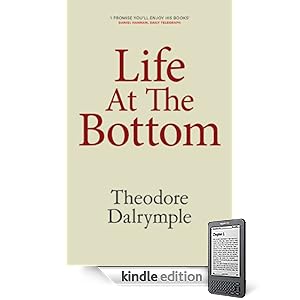Theodore Dalrymple is a British consultant psychiatrist who works both at an inner city hospital and in a prison. Life at the Bottom is a collection of essays about what he describes as the 'underclass' of British society - people without jobs or good education or stable family lives.
As you can guess from the way he labels them 'underclass', Dalrymple wasn't exactly an objective observer. I'm sure his views come from decades of experience with thousands of patients but he came across as overly pessimistic. He didn't seem to realise that as a psychiatrist, he would naturally see the patients that most need help i.e. those that are not responsible, functioning members of society. From these patients, he has drawn big conclusions that aren't always true. For example, he makes a lot of statements about the education system that as a teacher, I know are false. If he has fabricated and exaggerated in that area, it's reasonable to think he would have in others too.
Putting his bias aside, Life at the Bottom was pretty depressive reading. Dalrymple's main argument is that what is holding people back is not poverty or lack of opportunity, but ideas and attitudes. And it did have a ring of truth - there are schools where your life would be made a misery if you do well in lessons, and families without aspiration, into their third generation of unemployment. You absorb the values and attitudes of those you grow up with, and those attitudes can be a big brake on success.
In one essay, Dalrymple describes the experience of foreign doctors who come to do a year's placement in the NHS. At first they are amazed at how well everyone is looked after, and at how no one is allowed to go hungry, sick or cold. But as time goes on, their attitude changes as they see a poverty of ambition rather than a material poverty. Dalrymple contrasts this with the poor he saw when he worked in Africa, who took pride in always trying to better themselves. I do think too many people have poverty of ambition, in all sections of society, not just in the 'underclass'.
I will say that benefits and the sections of society that Dalrymple describes are an area I feel unsure of, politically. I used to have very clear cut liberal views but experience has clouded that a bit. Life at the Bottom hasn't made it any simpler, but it was interesting to read such a strong Conservative position.
Verdict: Interesting and a good conversation-starter
Source: Bought for my kindle
Score: 3 out of 5
The Literary Blog Directory is now up to 30 blogs! Thanks again to everyone who is taking part or publicising. Click on the picture for blogs to read, more information or to sign up.


I think I would just get irritated reading this, but I commend you for giving it a go.
ReplyDeleteI like that you finished what you started. Sometimes that is hard.
ReplyDeleteI don't read a lot of non-fiction. I think the lack of objectivity would bother me too. Doesn't sound like a happy read either.
ReplyDeleteP.S Thanks for adding my blog to the directory! I have added the button to my sidebar.
Susan - it was a bit irritating as his views were so extreme. Interesting, though.
ReplyDeleteMystica - haha, true! Even though the book annoyed me, I was still interested in it which made it relatively easy to finish.
Misha - I used to read 50:50 fiction and non-fiction in the days before book blogging but now I read mainly fiction. And you're welcome, thanks for using the button :)
The NHS does not just treat 'the underclass'. My mother is a psychiatric nurse and works in the same NHS trust (and nit for a mere decade an a half either) and has very different tales to tell. Just an FYI.
ReplyDelete